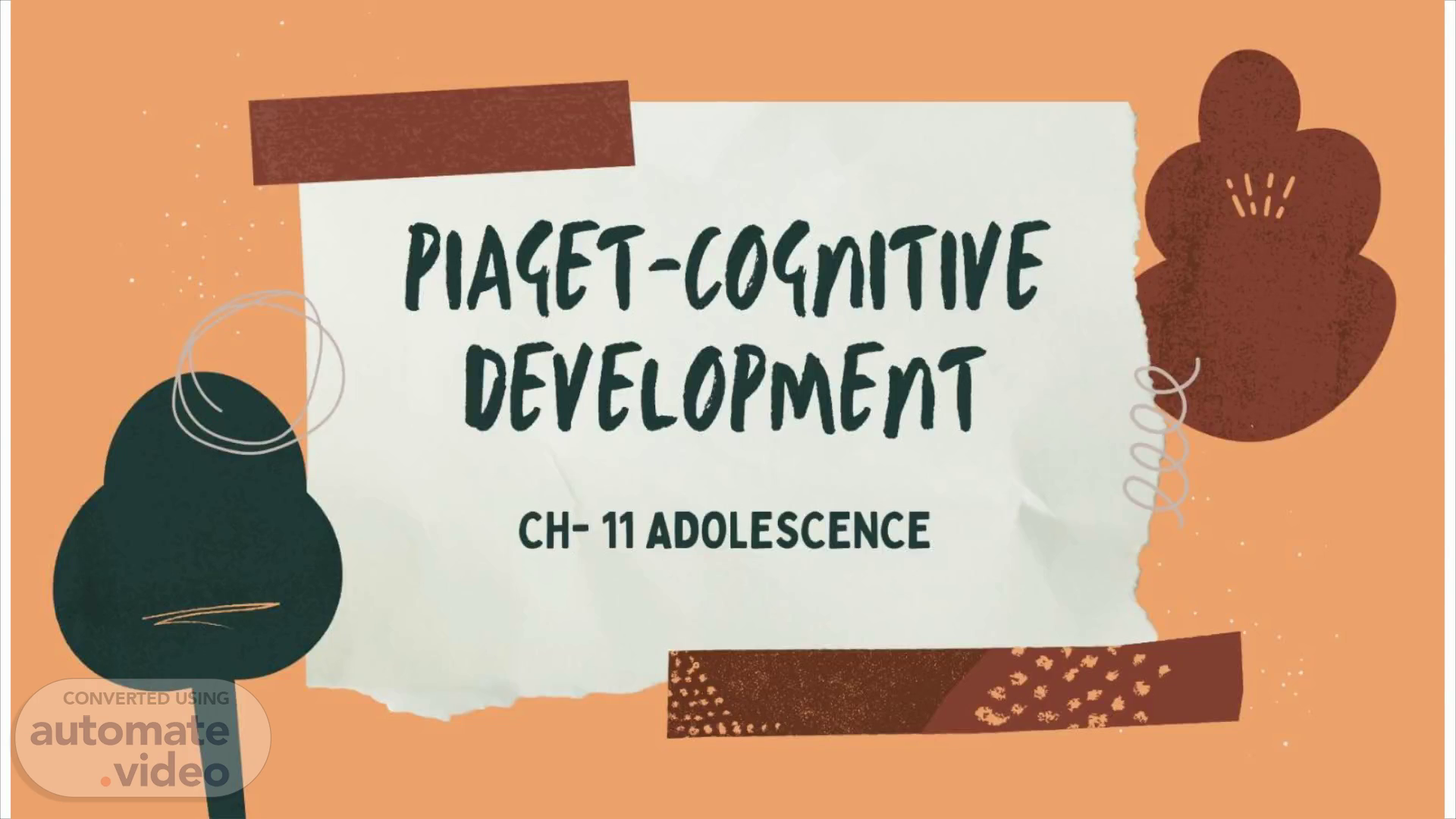
Page 1 (0s)
CH- 11 ADOLESCENCE.
Page 2 (6s)
INTRODUCTION Cognitive therapist Jean Piaget describes adolescence ag the stage of life in which the individual's thoughts start taking more of an abstract form and egocentric thoughts decrease. Thig allows an individual to think and reason with a wider perspective. Thig stage of cognitive development, termed by Piaget ag the formal operational stage, marks a movement from an ability to think and reason from concrete visible eventg to an ability to think hypothetically and entertain what-if possibilities around them..
Page 3 (28s)
FORMAL REASONING.
Page 4 (34s)
Formal reasoning is used to evaluate the form of an argument, and to examine the logical relationships between conclusion and their supporting assertions. by the age of 7 or 8 their inferences conform to strict rules of deductive logic, such references always begin with what a child believes or accepts. The concept of formal reasoning became and remained central to Piaget's conceptualization of formal operations..
Page 5 (52s)
HYPOTHETICO- DEDUCTIVE REASONING.
Page 6 (59s)
This type of thinking involves hypothetical ttwbat-ift situations that are not always rooted in reality. Examining children's reasoning across problems and agU, Piaß +oncluJeJ that the age ranß II-IT marked the emerßnce of '€0) what be called "formal» reasoning, Ly reasoning formally be meant (admitting a datum as such a deducing what follows from It' and engaging in (correct deductive reasoning'. Piaget explained that deduction must detach Itself from reality and take up Its stand upon the plane of purely possible, which is the definition of the domain of hypothesis..
Page 7 (1m 23s)
GROWTH OF LOGICAL THINKING.
Page 8 (1m 30s)
1. Three decades after Judgment and Reasoning, Piaget and hig longti collaborator Barbel Inhelder published. The Growth of Logical Thinking From Childhood to Adolescence. 2. From the interviews, each participant's actions, explanations, and justifications, taken ag a whole, were classified ag preoperational, concrete operational, or formal operational on the bagig of theoretical data associated with these three gtageg of development. g. It highlighted a profound reversal in the relation of reality to possibility in formal cognition. 4. Formal reasoning wag characterised ag second-order (and thug formal) activities, offering a structural understanding of the distinction between concrete and formal cognition. 5. The new book extended beyond cognition to examine the effects of formal proceggeg on teenage personality, social relationships, and societal roles in depth. fooV.
Page 9 (2m 4s)
REALITY AS A SUBSET OF POSSIBILITIES.
Page 10 (2m 11s)
2 the construction of formal operations a new mode f reasoning and a new way of understanding the world Field of possibility range from possible experiment outcomes: To possible - religions - Ideologies - social arrangementS Realities of all sorts potentially open to critique and reconsideration on basis of alternative possibilities.
Page 11 (2m 26s)
SECOND ORDER OPERATOR Classes and relations are control to logic.Piaget's brief in development of logical is that even infants groups and order objects in increasingly logical ways.With the emergence of representational intelligence in the second year of life,children classify and seriate mentally.Children's actions of classification and seriation become operations and they are reversible mental actions as they are reversible mental actions as they compose equilibrated structures..
Page 12 (2m 44s)
Piaget's structural model helps us see how the formal operational conception of reality as a subset of possibilities is not a retreat to fantasy but quite the contrary,a rigorous basis for experimentation and inference.
Page 13 (2m 57s)
ADOLESCENT THINKING.
Page 14 (3m 3s)
Inhelder and Piaget remind us (and perhaps themselves) that "there is more to thinking than logic" and more to life than thinking addressing the relation of formal operations to adolescent thinking and, beyond that, so adolescent personality and social o development. Reflective analysis of one's own thinking 3makes if possible to construct explicit "theories" and Sideological "systems". Adolescents "participate in the ideas, ideals, and ideologies of a wider group" with the aim of taking their "place in the adult social framework"..
Page 15 (3m 25s)
AS PIAGET ALWAYS INSISTED, "LOGIC IS NOT ISOLATED FROM LIFE; IT IS NO MORE THAN THE EXPRESSION OF OPERATIONAL CO- ORDINATIONS ESSENTIAL TO ACTION" ADOLESCENTS AND ADULTS ALSO DIFFER FROM CHILDREN WITH REGARD TO RELATED FORMS AND LEVELS OF REASONING, UNDERSTANDING, AND SELF-REGULATION SUCH AS DIALECTICAL THINKING, KNOWLEDGE ABOUT THE GENERAL NATURE AND JUSTIFIABILITY OF KNOWLEDGE, PRINCIPLED FORMS OF MORAL REASONING, AND REFLECTIVE SELF CONCEPTION RESEARCH WITH ADULTS MAKES IT CLEAR THAT THE USE OF FORMAL REASONING REMAINS INCONSISTENT, AT BEST, AND THAT WE ALL RELY ON AUTOMATIC PROCESSES AND SIMPLE HEURISTICS IN MUCH OF OUR THINKING (EVANS, 2002)..
Page 16 (3m 51s)
Adolescence after Piaget.
Page 17 (3m 58s)
Piaget himself recognized, thinking is more than logic and therefore 1. more cognitive development than development of logic. Piaget argued that "structural transformation [from concrete to formal operations] is like a center from which to emanate the various more visible modifications of thought that take place in adolescence." 2. Adolescents can develop what Piaget called formal operations, but even if this is a new stage in the development of logic, 3. it is not. so clearly a general stage of coit was clear that formal thinking IS not the competence to draw deductive conclusions (which existed years ago), but the ability to control these conclusions in a range of ossibilities (hypothetical Think). -deductive). Thinking about thinking is secondary thinking, but it is not clear how this relates to the logic of secondary operations. Campbell and Bickhard (1986) provided a Neo Piagetian theory that minimizes Piaget's structuralism and instead emphasizes his constructivist conception of development as a development process..